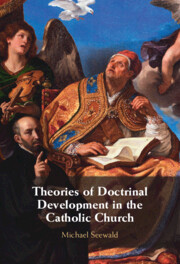Book contents
- Theories of Doctrinal Development in the Catholic Church
- Theories of Doctrinal Development in the Catholic Church
- Copyright page
- Contents
- Acknowledgements
- Introduction: What Is This Book About?
- 1 Defining Dogma and Development
- 2 The Bible: Both Product and Yardstick of Doctrinal Development
- 3 How the Early Church Reflected on Doctrinal Continuity and Change
- 4 Discussions in the Middle Ages on Changes to the Unchanging Faith
- 5 Theories of Doctrinal Development in the Nineteenth and Early Twentieth Century
- 6 The Twentieth Century: From Anti-Modernism to the Second Vatican Council
- 7 Overview and Outlook
- Epilogue: An ‘Obituary’ to the Church?
- Bibliography
- Index
4 - Discussions in the Middle Ages on Changes to the Unchanging Faith
Published online by Cambridge University Press: 18 February 2023
- Theories of Doctrinal Development in the Catholic Church
- Theories of Doctrinal Development in the Catholic Church
- Copyright page
- Contents
- Acknowledgements
- Introduction: What Is This Book About?
- 1 Defining Dogma and Development
- 2 The Bible: Both Product and Yardstick of Doctrinal Development
- 3 How the Early Church Reflected on Doctrinal Continuity and Change
- 4 Discussions in the Middle Ages on Changes to the Unchanging Faith
- 5 Theories of Doctrinal Development in the Nineteenth and Early Twentieth Century
- 6 The Twentieth Century: From Anti-Modernism to the Second Vatican Council
- 7 Overview and Outlook
- Epilogue: An ‘Obituary’ to the Church?
- Bibliography
- Index
Summary
The millennium that stretched approximately from the year 500 to the year 1500, and that we call the Middle Ages, is marked by a paradox. There was on the one hand an aversion among theologians to the idea of the new, and on the other the development of what are considered today often underestimated and highly innovative approaches in theological thought. The formula nihil innovetur nisi quod traditum est (be there no innovation beyond what has been handed down), which Cyprian (Epistola 74:1) discussed in the context of the rebaptism controversy, and which has been attributed to the Roman bishop Stephen I, became a set phrase during the period. The term ‘innovator’ was an insult, and innovations in theology were to be avoided, since they entailed the risk of deviating from the old, true doctrine.
- Type
- Chapter
- Information
- Theories of Doctrinal Development in the Catholic Church , pp. 85 - 107Publisher: Cambridge University PressPrint publication year: 2023

